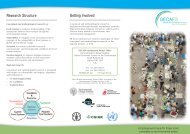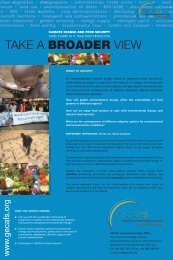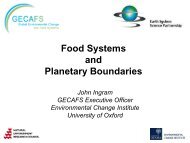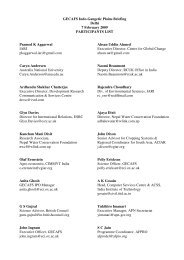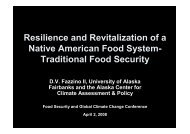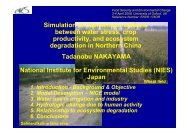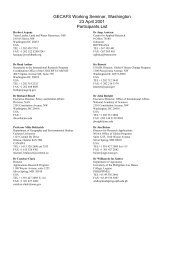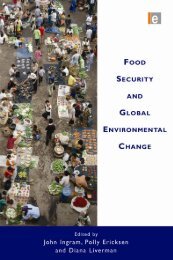From Food Production to Food Security - Global Environmental ...
From Food Production to Food Security - Global Environmental ...
From Food Production to Food Security - Global Environmental ...
- No tags were found...
Create successful ePaper yourself
Turn your PDF publications into a flip-book with our unique Google optimized e-Paper software.
Elements of good practice in stakeholder engagementA number of recent studies have identified problems experienced in the management andcommunication of research <strong>to</strong> inform policy-making and regulation (see, for example Holmesand Clark, 2008; Holmes and Savgard, 2008; Bielak et al., 2009). These studies have alsoidentified elements of good practice in respect of the planning and execution of research, thecommunication of results and the evaluation of uptake and impact which are now discussedbriefly. In addition, the Overseas Development Institution’s ‘Research and Policy inDevelopment Programme’ (RAPID) has published a wide range of practical frameworks and<strong>to</strong>ols for researchers, policy-makers and intermediary organizations, which are targeted atdeveloping countries (ODI, 2009).Given the importance of research influence on policy for actually making change happen,how can research-policy interactions best be enhanced? Bammer (Bammer, 2008a; Bammeret al., 2010) presents six checklists which illustrate complementary facets of this complexprocess:1. Barriers <strong>to</strong> cooperation between policy-makers and researchers (Gregrich, 2003);2. Different emphases of policy-makers and researchers (Heyman, 2000);3. ‘Irrefutability’ of the evidence versus the ‘immutability’ of policy (Gibson, 2003b);4. Five indica<strong>to</strong>rs of policy-maker responsiveness <strong>to</strong> research (Gibson, 2003a);5. Questions for researchers <strong>to</strong> think strategically about their interactions with policy-makers(Jones and Seelig, 2004);6. Questions and suggestions for researchers on how <strong>to</strong> influence policy and practice (Courtand Young, 2006; and see Table 1, slightly modified from the original).As highlighted above, research is more likely <strong>to</strong> be successful in informing regional policymakingor regulation if it involves the decision-makers mandated <strong>to</strong> work at this spatial level(and/or their advisors) in the planning stages of research projects and programmes. Where thenature of the issue requires it (contested issues, complex systems and uncertain science asdiscussed above) a broader range of stakeholders should be involved. Each player may seethe issue differently, reflecting what might well be their different ‘world views’: researchersthrough their disciplinary lenses; policy-makers and regula<strong>to</strong>rs as conditioned by theconstraints and pressures they are working <strong>to</strong>; and other stakeholders influenced by theirparticular concerns and experiences of the issue.If the answers generated by the research are <strong>to</strong> be meaningful <strong>to</strong> these different players, aframing of the research question needs <strong>to</strong> be arrived at through discussion that reflects theirvarious viewpoints. Framing issues and consequent research questions based on this isinevitably selective, and hence it is important <strong>to</strong> engage with as many different kinds ofproblem formulation as possible (Becker, 2003; Shove, 2006).78



